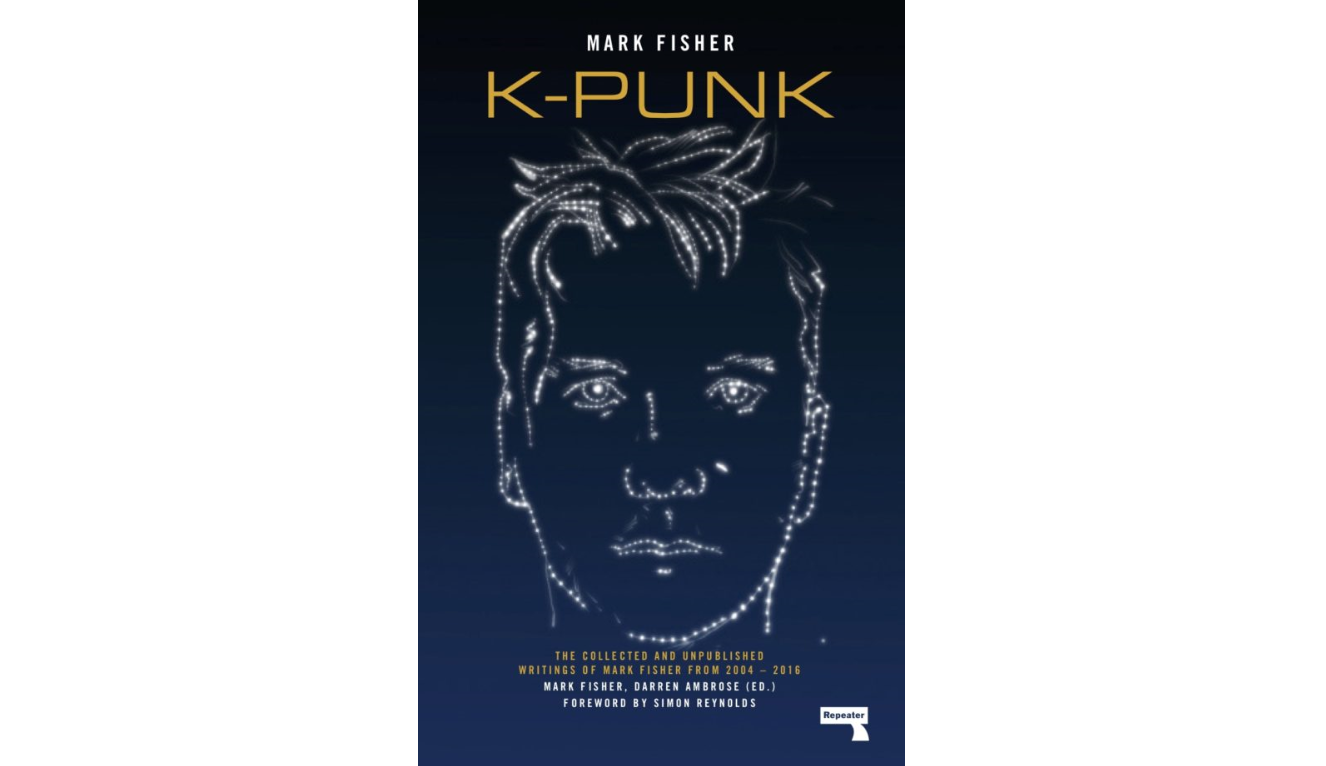 圖 © Editorial staff of NERO
圖 © Editorial staff of NERO
約一年多一點以前,我們有幸在羅馬與英國作家及文化理論學者馬克.費雪 1 進行了一場對談,當時費雪的新書《我生命中的鬼魂:論憂鬱症、魂在學及消失的未來》(Ghosts of My Life: Writings on Depression, Hauntology and Lost Futures,2014)正要問世,我們藉此機會與費雪探討了未來――不是他個人的或我們的未來,而是當今社會對於未來本身的認知。此刻,隨著時間流逝,我們或可追問那場對談是否仍關乎於未來,抑或是關於過往。
根據下文討論的觀點來看,相較於現在的時序,過去及未來的概念與定義出能容納爭議論點的空間更有關聯。爭議論點即如:對於未來的懷舊(nostalgia of the future)、雅克.德希達(Jacques DERRIDA)提出的魂在論概念及魂在論的憂鬱(hauntological melancholia)、社會性延遲(social delay)、過時性(obsolescence)及時代謬誤的常態化(normalized anachronism,anachronism亦可譯為時代錯置或時代倒錯)等。如果說費雪的書設法處理未來的消失,接下來無可避免的便是試圖去接受在新興虛擬、傳播科技及其開啟的後期資本主義意象影響與日俱增的時代裡,所謂未來的消失,真正意味著什麼。
尼祿出版社(NERO):我們就從您的新書《我生命中的鬼魂:論憂鬱症、魂在學及消失的未來》(簡稱《我生命中的鬼魂》)開始談談……
馬克.費雪:嗯,整體來說這本書談的是未來的消失,至少是在文化層面上。於我而言,21世紀的失敗正在於21世紀事實上未曾真正開始――在某種程度上指的是現在及未來的喪失,這在音樂領域中顯而易見。《我生命中的鬼魂》裡納入了發表於各處的數篇文章,以及為了此書特地撰寫的篇章,因此也可以說是擴增內容的合集。其中,我寫了數篇與魂在論有關的文章。魂在論一詞由德希達首創,並在2006年再次廣泛流通,我也重新運用這個概念,討論幾個不同的音樂人,如阿里爾.平克(Ariel PINK)、潔西卡.賴蘭(Jessica RYLAN)、The Focus Group與整個Ghost Box label的音樂製作等。也就是說,在《我生命中的鬼魂》一書裡,我試著詳盡地闡述這個概念如何重新流傳於世,尤其是在與音樂相關的討論中。
 圖 © Editorial staff of NERO
圖 © Editorial staff of NERO
講到魂在論,書中有一段節選聽起來像是此種美學的摘要說明,雖然那段跟音樂無關,描述的是1970年代英國電視節目的典型氛圍。現在的音樂家如Ghost Box label旗下的創作者便是仰賴這樣的記憶――您知道的,像BBC教育頻道、1960及1970年代的電視劇等。而他們常散發出一種憂鬱的氛圍,而這與單純懷念過往十分不同……
 妮娜.鮑爾(Nina POWER)拍攝的馬克.費雪(Mark FISHER),約攝於2000年代中期。圖 © Editorial staff of NERO
妮娜.鮑爾(Nina POWER)拍攝的馬克.費雪(Mark FISHER),約攝於2000年代中期。圖 © Editorial staff of NERO
憂鬱是貫穿整本書的主線之一。我認為1970年代後所發生的――尤其是在1980年代新自由主義崛起――便是所有事情都在變動的一種感受。然而,在那個當下我們可能無法確知變動會到什麼樣的程度,至少對我來說很模糊。我猜想部分也與我的年紀及我長久以來形塑的期待有關。生於1960年代末的我,一出生便身處在一個活力四射、充滿實驗精神的文化當中,也許可以用「體制外的教育系統」來描述那個環境。我自己當時不太喜歡學校,但我也不必喜歡它,因為我可以從其他地方學習。其中,音樂文化佔據了很大一部份,我第一次認識歐陸的理論學者如德希達或尚.布希亞(Jean BAUDRILLARD),便是透過音樂相關的傳媒,例如音樂雜誌《NME》等。那是我稱之為「流行文化現代主義」的一個廣大且緊密相連的網絡,一種宣傳、散播實驗性理論及文化的基礎系統。當時一切恰逢其時,事情就該如預期中那樣,沒有什麼特別的。然而到了1980年代間,這整個網絡卻慢慢消失了。一開始我以為那只是一個暫時的現象,一切最終仍將回復原狀。但我錯了,那是不可逆轉的變化。所以你看,被視為理所當然的事物就這樣憑空消失了,這讓我們陷入憂鬱,一種魂在論的憂鬱。
非常有趣,看看典型的憂鬱概念――例如圖像學學者提出的憂鬱――我們可以把它描述為一種痛苦的認知,當我們認識到相對於慾望,我們自身是有極限的。此處提到的「魂在論的憂鬱」與其不同之處為何?
 《我生命中的鬼魂:論憂鬱症、魂在學及消失的未來》書影。圖 © Editorial staff of NERO
《我生命中的鬼魂:論憂鬱症、魂在學及消失的未來》書影。圖 © Editorial staff of NERO
首先,我想先說明我試著將此種憂鬱跟典型的憂鬱症區分開來,雖然這對我來說是另一個重要議題了。因為你知道的,典型憂鬱症十分普遍,但它並沒有被廣為認知,至少沒有作為一個政治和文化層面的議題被認識,而是被當作病理學或家族史的問題來看待。也就是說,憂鬱是極度私人化的。我認為憂鬱症的表徵之一是低自我期待,他們對於生命並沒有太多期望;一切不斷惡化,他們也隨之改變,這樣的改變卻只是為了以一種更劇烈的方式讓一切保持原樣――這就是資本主義的原貌,所以會有這種基本上為了適應而產生的悲傷及憂鬱。而我所描述的魂在論憂鬱與此截然不同,也因此我把魂在論憂鬱與典型憂鬱對立起來討論:魂在論憂鬱是更有意識的運作表現,一種美學化的過程。如果典型憂鬱是理所當然的狀態、是適應當下現實的一種形式,那麼魂在論憂鬱便是拒絕去適應――或甚至無以適應。它會緊緊抓住本已消逝的事物。因此,比起說出「嗯,Public Service Broadcasting以前是如何,但現在一切都已經不一樣了。」這樣的話,你更可能直接拒絕接受該事物已消逝的事實。
為什麼那樣就算是「魂在論」?
這麼說好了,說出「噢,1970年代超棒的,讓我們回到那個年代」這種話當然很簡單,但是我認為真正的議題在於「1970年代時的我們所預想的未來是怎麼樣呢?」我的意思是,這原本該有一個軌跡的,但這個軌跡卻被打斷了。當時隱約預想的那個未來,在1980年代被新自由主義相關的價值終結了,而我們現在發現自己被那個未來深深籠罩著。從這樣的觀點來看,左派在1980年代面臨痛苦難忘且殘暴的挫敗並非偶然,至少在英國是如此。
您正把魂在論的另一個重要主題帶入這個討論裡:所謂「對於未來的懷舊」……
「對於未來的懷舊」的概念,部份闡述了我嘗試透過這本書表達的其中一個悖論。舉例來說,魂在論的音樂常常被評為「帶有懷舊情懷」。某種程度上,這也沒有錯,但重點在於「相對於什麼的懷舊情懷?」我的意思是,整個21世紀的音樂場景都可被描述為帶有懷舊情懷:那現下的未來感究竟在哪裡?時至今日,如果你問人們何謂「未來音樂」,許多人的回答會說是1990年代的電子樂,或甚至德國樂團Kraftwerk以及其他類似的音樂。某種意義上我們仍依賴著一個舊有的未來。

您對於近年的蒸氣波(vaporwave)及「虛擬廣場的普普藝術」(pop art of the virtual plaza)的現象有什麼看法?據音樂評論家亞當.哈珀(Adam HARPER)的說法,藝術家如詹姆斯.法拉羅(James FERRARO)與法蒂瑪.阿爾.卡蒂里(Fatima Al QADIRI)等人至少試圖在音樂裡重新思索未來這個概念,並從虛擬科技及整體後期資本主義意象汲取靈感……
我個人認為蒸氣波其實仍依附於20世紀對於未來的想像。其聲音的質地乃至於意象皆以1990年代公司企業的資訊來源為基礎進行演繹。蒸氣波被視為「未來派音樂」這件事也在在顯示了一種弱化的期待:我們真的能把它與像是Kraftwerk樂團相提並論嗎?或是和叢林音樂(jungle music)、BBC音效工作室(BBC Radiophonic Workshop)相比?上述這些例子皆明確地為社會帶來了一種未來性的衝擊,類似「到底這是從哪裡來的?」的感受。聽過這些音樂創作後,人們勢必會重新建構他們對於原先周遭音樂的理解。可惜的是,我認為蒸氣波這類的音樂並沒有這樣的特質……
儘管如此,這些創作者如何去連結21世紀的經典意象仍然十分有意思。這邊引述自英國音樂雜誌《The Wire》對法蒂瑪.阿爾.卡蒂里專輯的評論:這音樂「想像出一個有著瘋狂活躍的物質的世界,而在iPad之外沒有任何生命存活。」你無法否認這樣的描述聽起來像是一面鏡子,映照出我們所處的時代。
我認為卡蒂里的創作之所以能映照出現在這個時代,也是出於和我們的時代沒有特別關聯的緣故,至少那是以一種過去的音樂作品曾經運用過的手法所做到的。請別誤會,我仍真心地認為這樣的音樂創作應受到重視,當我在柏林電子音樂與視覺藝術節(CTM Festival)聽到大型音響播放一些蒸氣波的音樂時,確實相當有趣,而你聽得出來它不該以這種方式被聆聽。你知道的,聲音的壓縮、聲音本身……彷彿是為了智慧型手機與平板裝置而生的音樂。
音樂及智慧型科技之間的關係也與發生在我們日常生活中視覺面向的改變很類似:「圖像/影像」的概念已經無法與播放裝置分開來看了……
確實如此,智慧型手機與平板裝置越來越變成――就算不完全等同於――當今所呈現的圖像/影像自身,以至於傳播科技已經完全殖民著我們對於科技的認知,這也是另一個21世紀的現象。想想看:20世紀時,我們對於傳播裝置的重視程度為何?人們當時在乎的是音樂的科技層面,因為我們確實聽得到那些音樂……但像是電話或是類似的東西,有誰真的在意呢?
這類型的傳播科技同時也影響著我們對於再現的認知。舉例來說,當今恐怖電影的寫實主義常常以「數位影片素材」的概念為基礎(例如:呈現超自然事件的素人影片等),簡單來說,業餘人士的鏡頭所能捕捉的畫面是「真實的」。考慮上述,您認為我們對於現實的理解,以及我們和想像之間的關係,會受這類科技影響多深?
 圖片來自k-punk.org網站,2015年5月24日。圖 © Editorial staff of NERO
圖片來自k-punk.org網站,2015年5月24日。圖 © Editorial staff of NERO
看起來像是科幻敘事對於科技曾有的宏大想像已經被忘卻了。我的意思是,我們可曾經討論過外星環境地球化(terraforming)、改造行星、改變太陽系等等!以前的話題是外星環境地球化,到了今日卻是討論如何更方便地連上網路。這本身就是一種減縮。無論如何,概略而言,我認為我們太過重視線上數位性了。這也完全主導了我們對於現下和未來的認知,而我認為真正的現象學現實存在於與――那些我更偏好稱為「資本主義式的網路虛擬空間」的互動中。因此我不去討論如此意義下的科技,而著重科技在經濟體系裡的運作方式,例如,數位科技的一個關鍵元素在於總是稍微延遲的感知。以推特(Twitter)這樣的社群媒體來說好了,你在一個長期的反應狀態之中,從事實來說你就在那裡,也永遠都是延遲的,因此你總是處在輕微或強烈的焦慮狀態。我們有點將此現象正常化為神經系統的一部份了,即使某些事物的發生讓人感覺起來像是瞬間當下的,也不盡然是如此。就部份而言,這是一種廣泛的匱乏感,感覺事物永遠都在延遲,這也是數位的一項特徵。資本主義式的網路虛擬空間要求注意力不斷發散,你總是被徵求著回覆及回應,因此很難沉浸於任何事物。再者,數位傳播的基本形式是指令:每次拿起智慧型手機時,它會告訴你該做些什麼,就算許多指令可能友善無害,仍可能對你的神經系統帶來龐大的壓力。光是應付或甚至無視這些指令,就已經阻礙我們與未來建立具建設性的關係:這是時間觀崩壞的另一個面向。
另外一個現象是資訊氾濫。您是否會覺得,在看了許多事物之後,便會感覺自己已經看過一切了?
嗯對,確實如此。然而在過去,人們也不僅僅是因為暴露在較少的資訊之中,而感覺自己正在體驗新的事物。當時的人們確實經歷著前所未見的變動,那不只是一種幻覺。
但您難道不認為科技以某種方式影響了我們的想像嗎?舉例來說,有很長一段時間人類透過新科技的發明來想像未來(如達文西〔Leonardo da VINCI〕、艾西莫夫〔Isaac ASIMOV〕等人);在1990年代,科技被視為在美學或政治方面促成改變的工具(好比電子音樂、賽博龐克等)。到了現在,科技則成為一個「告訴我們何謂未來」的主體,致使我們無力想像未來……
我十分同意。仔細思索便可知當今社會的我們並沒有「未來」,我們只有升級。某種程度上這是一個先於後現代主義的東西。整個現代性經驗是正經歷的當下就已經過時的一種雙重感知,因為現代性是一個永遠不會抵達終點的過程:沒有止歇、沒有平衡點,只有永無止盡的升級。今日像蘋果(Apple)這種大企業的商業模式,就是完全建基於過時性。即使只單純考量iPod的耐用性,你也不會指望長久只使用同一台iPod裝置,……我手邊已經有五或六台iPod了!
 1982年的電影《銀翼殺手》(Blade Runner)。圖 © Editorial staff of NERO
1982年的電影《銀翼殺手》(Blade Runner)。圖 © Editorial staff of NERO
那現代主義的取徑,與這個姑且稱之為以「後於後現代」的方式作為一個現代主義者,兩者之間有何不同?
嗯,我的意思是現代主義的遺緒其實就是對於嶄新性的認知,如同在傳統的現代主義裡一般,不過它已經被轉化為升級的概念了。在過去,對於未來的宏觀想像本質上是一種從當下跳脫的龐大錯位,而那樣的想像如今早已不復存在。以科幻領域來說,我覺得這個類型在1980年代便已面臨危機,但不管如何最後一部卓越的科幻電影仍來自那個時代。今日,我們仍困在《銀翼殺手》(Blade Runner,1982)、反烏托邦城市或甚至威廉.吉布森(William GIBSON)的賽博龐克中……。我甚至可以說《駭客任務》(The Matrix,1999)本身,與其所想像的全面模擬的社會,也並未帶來新意。也許《關鍵報告》(Minority Report,2002)彈出式的企業廣告,甚至比吉布森更能捕捉資本主義式網路虛擬空間的現實――當今的網路虛擬空間就像那些不斷彈出的廣告視窗,指令我們做這個做那個,我們並未全然沉浸其中,它更像是日常生活中的背景噪音。
讓我們回到――依您的分析――通往未來的軌跡被打亂的時代:1980年代。也許不可輕忽的一件事是,1980年代也正是後現代美學變成普遍語彙的一段時期。我們經歷了歷時30年的時代擬仿(temporal pastiches)、過去與現在的時代謬誤(past and present anachronisms)、雙重解讀(double codes)、來自不同年代的引述或挪用(quotations and appropriations from different eras)……難道那不也是一種對於未來本身的否定嗎?
當然。如果閱讀像是1987年布希亞的《The Ecstasy of Communication》,會發現訊息過度氾濫、無法建構內外差異,也無法處理光環與私人領域的維護等,這些布希亞所談的問題,基本上就是在講推特跟臉書(Facebook)!而其他作者如詹明信(Frederic JAMESON)在1980年代的著作也帶有令人驚訝的預示性。後現代主義在1980年代的獨特性,成了今日主流的美學典範,使我們難以看見其他可能。詹明信最精闢的分析之一,是意識到時代謬誤正在浮現,並吸引著人們的注意力:像是《體熱》(Body Heat,1981)這樣的電影,設定在1980年代,也有其年代的美學風格,但它帶給人們的感受卻更近於1930、1940年代的黑色電影(film noir)。現在,當代場景與過時事物的混合正是21世紀眾多文化產物的指標。我們使時代謬誤自然化了。
那物理空間呢?我們討論了後現代主義如何重新形塑我們與時間的關係,但若仔細思索,「後現代」一詞一開始是出現在建築領域裡,作為抵抗現代主義建築運動。
我認為建築領域中現代主義的挫敗,如歐文.赫瑟利(Owen HATHERLEY)在《Militant Modernism》一書中所描述的,正是我所勾勒的樣貌的一部份。像倫敦這樣一座城市,最具有未來感部分是粗獷主義(brutalism)建築佔據的地方。當你造訪巴比肯藝術中心(Barbican Centre)時,由於建築本身的現代主義風格,你會不自覺地想到未來。時尚產業也是一個例子,它看起來像是停滯了,週期性地使舊風格重新現代化。這甚至不是時尚曾有的樣子。
 倫敦巴比肯藝術中心(Barbican Centre, London)。圖 © Editorial staff of NERO
倫敦巴比肯藝術中心(Barbican Centre, London)。圖 © Editorial staff of NERO
在此意義之下,您對於西蒙.雷諾茲(Simon REYNOLDS)談流行文化對於自身歷史之迷戀的著作《Retromania: Pop Culture’s Addiction to Its Own Past》有什麼看法?
我大致同意西蒙的分析,不過最主要的差異可能在於他將懷舊狂熱視為一種網際網路的相關現象。當然,網路徹底改變了我們的生活,永恆時間的概念也深刻影響我們的習慣,甚至是在音樂方面。但我們同時也必須意識到時代謬誤的自然化所帶來的後果及副作用,這些議題不只與某些空間如網路有關,它們同時也是政治性的,包括我們使用網路的方式,以及網際網路如何作用於我們的經濟社會。
我們一開始提到您在1970年代成長背景的「體制外教育系統」,及其如何形塑出「流行文化現代主義」這樣的普遍概念。您認為年輕世代要怎麼與之產生共鳴?他們對於「未來」的概念如何和舊有的相較?
我認為他們仍然會感覺到自己需要未來主義(futurism),只是那是就前者虛擬的、鬼魂般的存在而言。這也造成了他們對於當下沒有具體不滿的狀況。然而當你製造出某些事物,同時卻又有一種,這一切都已經有人做過了的感覺……這讓人感到難過,你懂吧?
※ 特別感謝彼得.沙蘭(Peter SARRAM)教授及約翰卡伯特大學(John Cabot University)促成此對談。